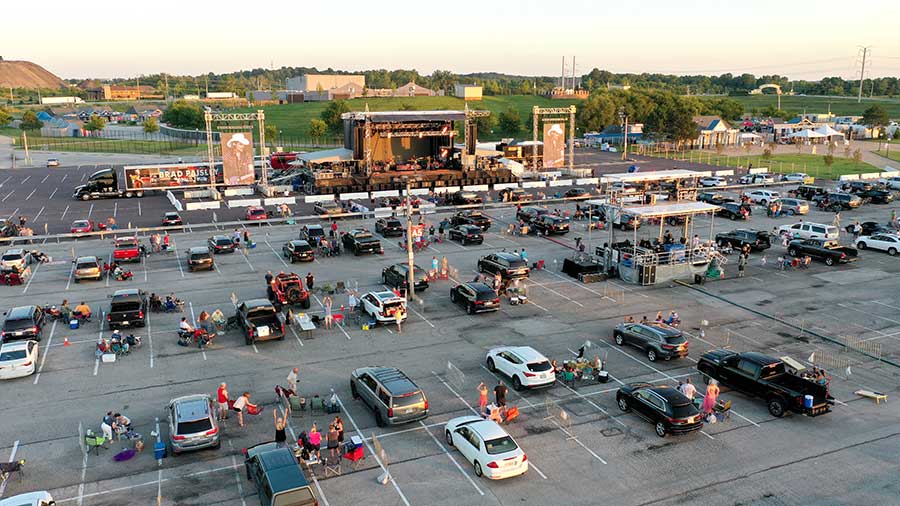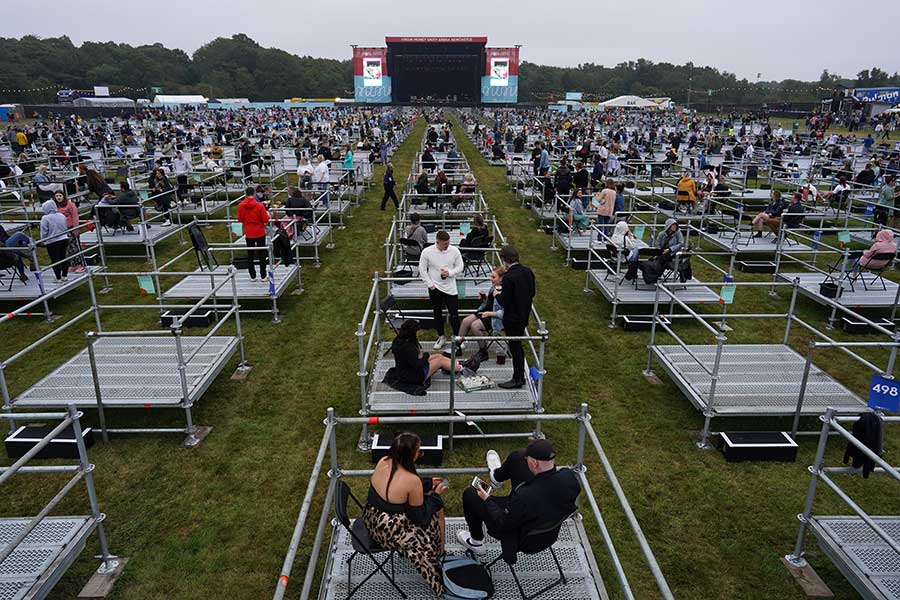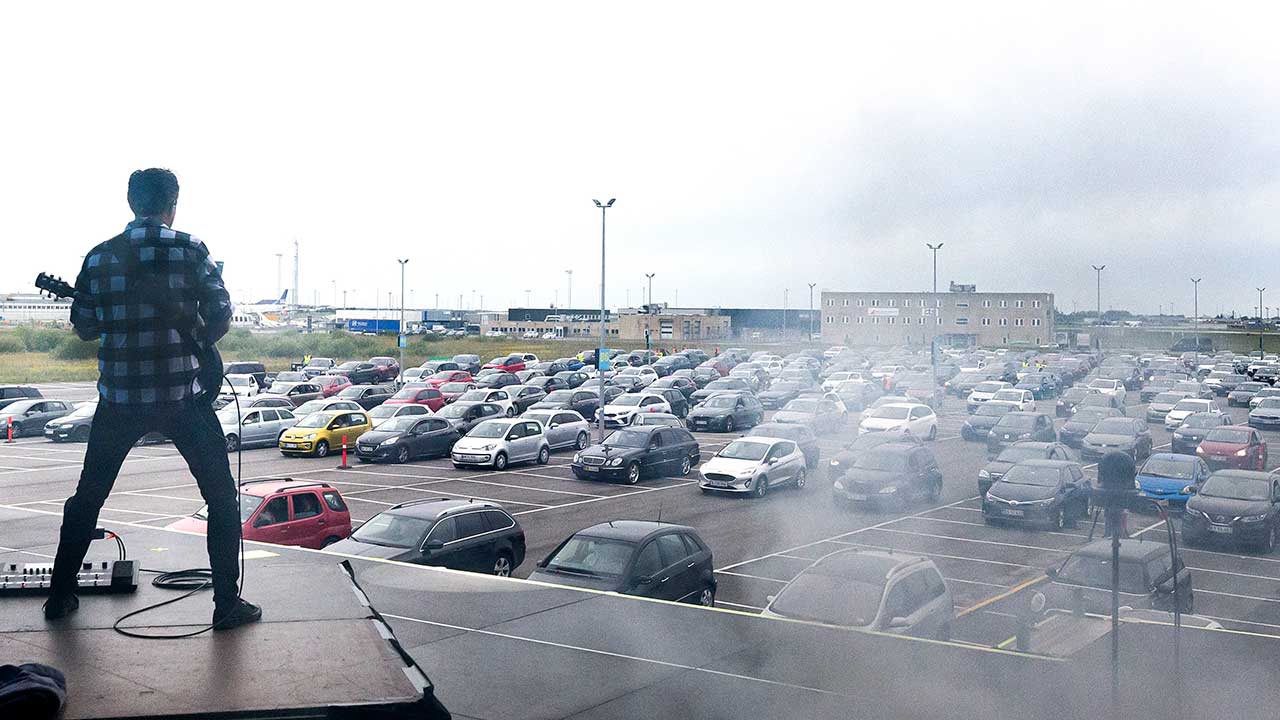COVID-19 still has the music world in its infectious tight grip. When Britain’s government declared that pubs in England could reopen on July 4, but that live entertainment remained off limits, musicians – many struggling financially – continued to look for ways of presenting their art and also ways to generate an income.
An American company called Cadenza TV has begun streaming pay-per-view multi-camera live electric concerts. Back in April The White Buffalo (aka Jake Smith) presented the first of a pair of shows via Cadenza as part of the promotion of his new album On The Widow’s Walk. First, fans from 68 countries tuned in to watch an hour-long show followed by a Q&A, presented in HD-quality audio. And in June, Cadenza broadcast a special set with a set-list chosen by fans, presented from the Belly Up Tavern in California.
“Nobody is claiming that digital performances will ever replace a live show,” Cadenza’s Stephen DeBrincat tells Classic Rock. “It’s sweat, the energy and the excitement that make the experience of seeing a band on stage so special. But I believe that what we have here gets as close to that as current circumstances will allow.”
Approximately 1,500 viewers paid to watch the Belly Up Tavern performance broadcast, which had a three-tiered ticket price. And it seems the arrangement is a win-win for everyone concerned: fans receive their fix of music, artists get to perform and get paid, and venues are able generate vital income.
"The Belly Up Tavern had been closed for three months, so for us that income was priceless,” says the venue’s Chris Goldsmith. “Getting to stage live music again was a joy and a blessing.”
How complicated were the logistics when compared to a regular concert?
“It was complicated. Firstly, we did a thorough deep-clean of the hall. Of course, it was essential personnel only – the band, the camera crew, a sound engineer and a lighting person. We were very conscious of social distancing; everyone wore masks, including the band, except when they were on stage. We had giant exhaust fans, and the doors were kept open so everyone felt safe.”
Crucially, the quality of the streamed concert was comparable to a DVD. As fans will be all too aware, many living-room web-broadcast shows, often shot on a smartphone, are haphazard. Following their success with The White Buffalo, Cadenza are looking to present more artists.
“A lot of bands are trying to work out strategies of how to perform in this new world, and we are helping them with that,” says DeBrincat. “We are going to do some shows in the Netherlands and some in the UK, as well as in the States and Canada. Our pitch to bands is: ‘We know this is scary for you. You have no idea how many fans will show up. But we are willing to take on that risk.’ In the next few months you will be seeing a lot of these shows popping up on the horizon, across different genres.”
The White Buffalo took pleasure from his unusual performance at the Belly Up. “I love that the presentation was top-quality,” he tells us. “I’ve seen other shows where somebody is sitting in their underwear in their house, the audio cuts in and out or the picture quality is pixelated; this is a whole different model. I must say that playing to a room full of cameramen instead of an audience is weird. At first I felt quite awkward and had to navigate around that, so it’s still a bit of a learning curve. It will also have felt a lot different for the fans at home in front of their computer or TV screens.”
The ‘protocol’ of finishing a set proper, leaving the stage and returning for an encore, and even a second encore, as witnessed at the Belly Up, is something that artists are going to have to work around. Those extended silences were pretty painful for the performers.
“Yeah, totally,” TWB acknowledges. “I wasn’t planning on doing a second encore, but I was told that a bunch of people had requested one, so why not?”
He also believes that, for the time being at least, professional streamed shows are probably the best way forward when it comes to live entertainment while venues remain closed.
“I don’t think they will ever be a permanent replacement for concerts as we knew them and will hopefully know them again, but as a temporary replacement right now we don’t have any other options,” he points out.
The singer admits having felt “conflicted” when it came to releasing his latest album On The Widow’s Walk during the pandemic, but reached the conclusion that “people need new music to keep them entertained during difficult times. I just wish we could get out on the road and promote it. I just wish I knew when all of the troubles we’re having with live shows will end.
"Nobody knows. And when that time comes, what will things look like? Will artists play bigger rooms but with smaller capacities, to allow social distancing? And how do you police [the audience’s behaviour]? Everyone used to run to the front of the stage. Would you have areas taped off, or squares on the floor? I just don’t know. “And even then, how many venues will survive the months without income?” he continues.
“I’m hearing worrying rumours the Troubadour [in West Hollywood], which has staged concerts for sixty years, might not reopen. That would be a terrible loss.”
Would he consider performing at a drive-in, as other acts have tried?
“Absolutely,” he says. “Right now we’ll look at just about any option that would allow us to get back out there again."

In the UK, concert promoters Live Nation put together their own open-air travelling package. Utilita Live From The Drive-In was due to visit 12 venues across the UK from the end of July until September, with a line-up that included Ash, Skindred, Reef Featuring Andy Taylor, Gary Numan, Kaiser Chiefs, Beverley Knight, Bjorn Again, Dizzee Rascal and more. But plans were scuppered as lockdown conditions changed.
"We received huge support from artists, the live music production contractors, our headline sponsor Utilita and of course you, the fan," said Live Nation in a statement. "However the latest developments regarding localised lockdowns means it has become impossible for us to continue with the series with any confidence."
It wasn't going to be a normal show. In accordance with health regulations, 300 cars were to be allowed per drive-in show, with two to seven people allowed per vehicle, while alongside each car there would be room to stand or place folding chairs.
The drive-in format has already been tried out on the continent. Following her performance in the German city of Worms, former Warlock singer Doro Pesch posted a photo of herself off stage amid cars full of fans but keeping at a permissible distance.
“What an amazing crowd,” she said. “We had a blast.”
But the idea certainly doesn’t appeal to everyone. Machine Head frontman Robb Flynn remarked to Kerrang!: “I watched some drive-in show where people sat in their cars, and honked when they liked what the band played. It was the stupidest fucking shit I’ve ever seen.”
Man, our first show at a #driveincinema / #Autokino was soooo #awesome! What an #amazing crowd! We had a #blast! #Worms, we #love you!See you in #Bottrop in the Autokino am #Movieparkgermany on #June 28th!Get tickets here: https://t.co/Mz146E6Q4y🤘💪❤️#Cheers, #Doro pic.twitter.com/moPm4CeEILJune 13, 2020
Former Duran Duran/Power Station guitarist Andy Taylor, who was due to perform with Reef on Live Nation’s package, believes the format has been well thought-out.
“Up to seven people in a car and an allocated space at the side to stand and drink – that’s plenty of room to mosh,” he tells Classic Rock. “The way I see it, we needed to introduce something new, because for the next year everything is going to be completely fucked. It has to be this format. The only other choice is staying at home. And after the pent-up hell and frustration of the past several months, I believe that people deserve some entertainment. This gives us a chance of raising something from the ashes.”
Perhaps the biggest issue of all, though, is how many concert-goers will feel safe to return to live events when guidelines permit. In a recent survey, only 36 per cent of those asked answered ‘yes’ to the question, despite 89 per cent insisting they were keen to experience a gig again.
In June the Music Venue Trust called upon the government for a £50 million cash injection to prevent the closure of a plethora of venue businesses. In addition, as part of UK Music’s #LetTheMusicPlay campaign, over 1400 artists sent an open letter to the Culture Secretary calling for help to secure the future of the UK’s live music scene. In response, the government announced a £1.57bn package of support for the entertainment sector.
Meanwhile, as the industry attempts to work out where its future lies, artists continue to use the internet as a platform for workshops, podcasts, concerts and as a method of raising vital funds. The Music Venue Trust has teamed with Marshall Records to create a unique #saveourvenues T-shirt. All donations are welcome.
Elsewhere, via the music subscriber Patreon, bands have offered cheap deals for exclusive access to new music, special playlists, live Q&As and more. Lionize frontman Nate Bergman, for example, is showcasing his soulful outlaw country-come-heartland solo style (with new songs, live concerts and more) exclusively via Patreon for five dollars a month, while Massive Wasgons launched Wagons World, promising to give fans access to the band's inner circle and build a community around their music.
Gibson TV streamed ‘Homemade Music Sessions’, with performances from former Doors guitarist Robby Krieger, Lzzy Hale and Joe Hottinger from Halestorm, Bon Jovi guitarist Phil X, Jared James Nichols and many more. Guy Pratt, the British bassist and songwriter best known for working with Pink Floyd, reached 10 episodes of his master-class series Lockdown Licks. Some artists, such as Steven Wilson and Tim Bowness, continued to release fascinating podcasts.
For artists who perform online regularly, the challenge is keeping things fresh. UK rockers SKAM revisited each album from their catalogue in its entirety, followed by a New Wave Of Classic Rock covers set, and a set of songs they’d done in previous weeks (voted for by fans). Others used the downtime to collaborate with friends, hence the Cherry Truck Band series, a fusion of Black Stone Cherry and Monster Truck. From their living rooms they offered a live, fly-on-the-wall style insight into the process of writing a song.
Last month the UK's first venue built for social distancing events was announced – the Virgin Money Unity Arena at Gosforth Park in Newcastle – and a week ago the first show took place. Groups of up to five fans had their own viewing platforms to minimise the risk on infection, while audience members wore face coverings as they made their way to the site and collected pre-ordered drinks.
What's next? More shows at at Gosforth Park have been confirmed – a rare show of certainty in an extremely uncertain world – but normality still feels like a very, very long way off.


